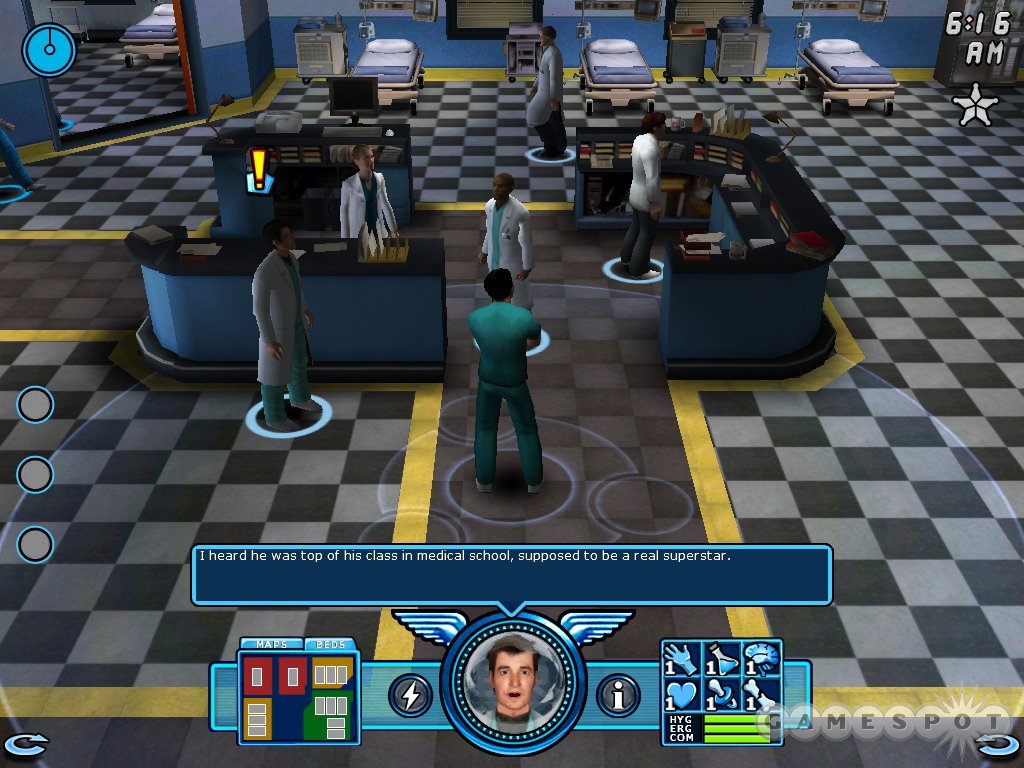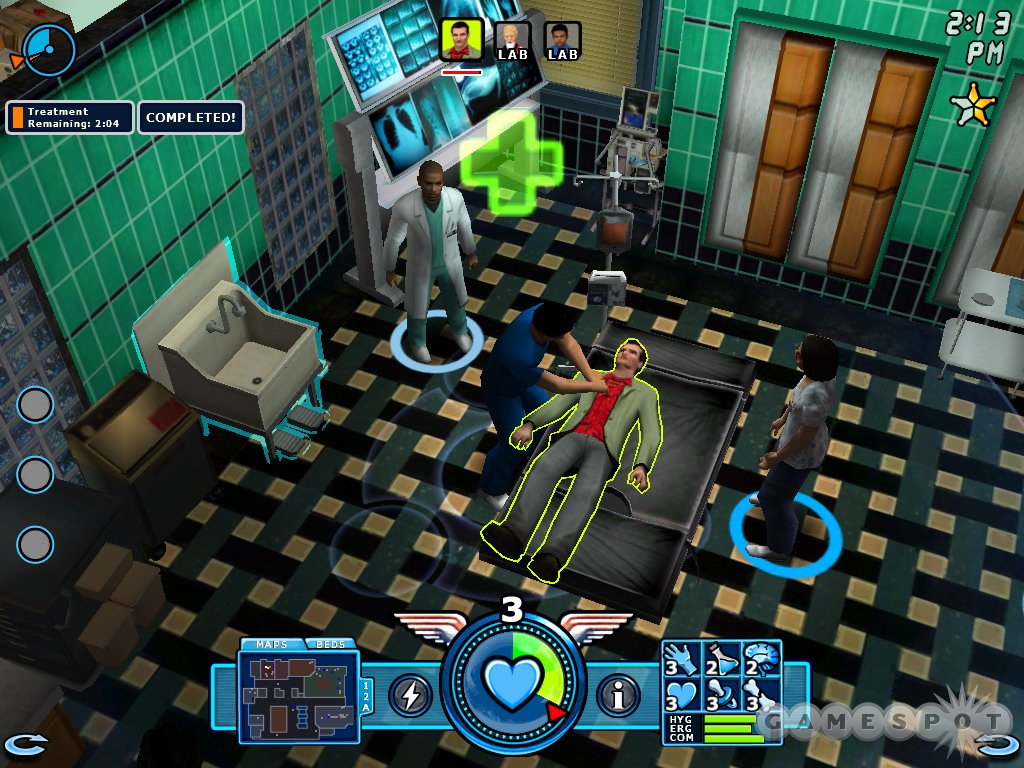For a game based on one of TV's most popular medical dramas, Legacy Interactive's ER is lacking in the drama department. In fact, this may be the dullest game ever concocted around the concept of saving lives and the sexy, melodramatic stories of those who do the lifesaving. ER basically eschews the medical simulation genre in favor of something that vaguely resembles The Sims. You'll create your own doctor, take him through several "episodes" of mundane medical work that requires next to no effort on your part, and occasionally engage in unnecessary social interaction with the random batch of characters who wander the halls of Chicago's County General Hospital. While the game is squarely aimed at those with an interest in the TV show rather than at those who play games on any kind of regular basis, even casual players will find themselves terribly bored by ER's take on life in the emergency room.

The game's general barrenness is apparent the moment you try to create your character. The list of character customizations is limited; you can alter only the most obvious characteristics, like gender and skin color. You'll then fill in a few stat bars with some allotted character points, which help determine your doctor's strengths and weaknesses in the six types of medicine featured in the game: cardiology, neurology, general surgery, toxicology, pediatrics, and orthopedics. The mechanic of learning these different specialties is just about the most stupidly easy thing on the planet. When you first arrive in the ER, Dr. Carter (as voiced by Noah Wyle) assigns you to triage in the waiting room, which is where you'll be spending an awful lot of the game. To diagnose a patient, you click on the patient, which will cause your character to wave his or her arms around in one motion or another, and then a magic diagnosis will appear in the lower section of the heads-up display, along with a level number that indicates how severe the case is. If it's too severe for you, you can opt to assign it to a higher-ranked doctor. If it's on your level, you'll then assign the patient to a bed, at which point you get to play doctor.
Unfortunately, treating a patient is no more exciting than diagnosing one. Once you assign a patient to a bed, you can simply click on that patient's icon, and you'll slowly wander over to the assigned bed (as will the patient). Once you're at the bed, you'll need a nurse. Sometimes one will already be there, and sometimes you'll have to wait for one to show up. After that, just click on the patient again, and you'll begin waving your arms again. Sometimes the patient's injury rating will start to drop, sometimes it'll go up, and other times you'll realize you need a new diagnosis, at which point you'll send the patient to the lab for more tests. Most times, however, you can just cure the patient right then and there, and that's it. That's the extent of the work you'll have to do when saving someone's life. Point, click, point, click, done. It might not be so bad if there were some variation in the process, but there isn't. Occasionally, specialized patients (like a karate master or a robot...wait, what?) will wander in, and one of the main doctors will ask you to treat them, but the only difference between these specialized patients and the regular patients is that the specialized patients often require more lab tests. Otherwise, you're just running back and forth between the waiting room and beds and quickly dealing with them. There are no big, dramatic trauma-room sequences with multiple doctors all trying to heal some gravely wounded person, like on the TV show. The game is devoid of even the slightest measure of drama.
ER does try to toss some story at you from time to time, but mostly it's inconsequential stuff. There are themes to each episode, but they don't tie together well. In one episode, a convention center catches fire during a comic book convention, and a whole slew of superhero-garbed nerds start flooding into the ER. While this could have been turned into something interesting, it isn't. Mostly you triage them like you would anyone else--there just happens to be more of them. Occasionally, the other doctors will toss different objectives at you in the same manner they assign the special patients to you. For instance, in one situation, you have to track down a pair of snooping reporters who are ambling about the hospital. Some of the objectives and special-patient assignments don't have to be completed, but others do, and if you don't finish the ones that are required, it's game over. There's also no checkpoint system in the game, so it's up to you to manually save as often as possible, otherwise you have to restart the game from your last checkpoint, however long ago that might have been.
To be fair, there are other aspects to the game, though they're just as mundane as the whole lifesaving thing. One area of note is the character management system, which feels like a low-rent version of The Sims. Your character has three stats that must be maintained at all times: hygiene, energy, and composure. Each one drops slightly as you go through your 48-hour shift in the ER, and after a while you'll need to replenish them by doing things like going and grabbing some food in the cafeteria, taking naps, taking showers, and even doing quick workouts in the gym. Some patients will even give you special gifts, which are boosts to certain stats and abilities that you can use at your leisure. While all of this sounds relatively decent, the stats themselves don't seem to have nearly the effect on your character that's advertised. One of the warnings Dr. Carter gives early on is that you must maintain your hygiene level carefully, or no one will want to work with you. What he didn't mention is that you can let it get all the way to the bottom before it even begins to negatively impact the game, which can take a very long time. You can go next to forever without taking time to boost your stats, and there's no urgency to any of them.
The gameplay mechanic that had the potential to add the most depth to the experience instead comes off as completely perfunctory. Essentially, you have the ability to socialize with your various hospital colleagues at pretty much any point during the game. Just right-click on them, and select the interact option. A chat menu will appear, with all sorts of topics and emotes you can select from the conversation. It's a great concept, but it's horribly executed. The whole thing is guesswork, since there's no way to clue in on the best way to begin a conversation. Abject praise tends to work, but even that sometimes causes a negative reaction. Generally, once the person you're conversing with picks a topic, all you need to do is pick that same topic next, and you'll get a moderate boost in positivity. This turns into a weird game of mimicry that isn't fun or interesting. Worse, even though the game purports that the social-interaction aspect is key in establishing cliques and good working relationships with the staff, you really don't need to do it much. An occasional conversation seems more than sufficient, and enacting a romance with another character merely gives you a mild composure bonus. It's a pathetically limited system, and it has no bearing on the gameplay.

ER's presentation is better than its gameplay, but "better" in this case doesn't equate to good. The look of the game is somewhat Sims-like, with the camera taking sort of an isometric view of your character and the hospital and all the characters taking on kind of a goofy, exaggerated look. The animations resemble those of sims, with wild gesticulations representing specific actions. While that works fine in a game like The Sims, which is meant to be kind of off the wall to begin with, the association with the name ER makes the atmosphere in the game feel off-kilter. The same problem arises with the cases. One moment you'll be dealing with weird patients, like guys in superhero costumes, and then the next moment you'll be having a somber talk with the other doctors about how you never get used to losing patients. While the TV show does try to mix the absurd with the melodramatic, the game leans way too heavily on the absurd for its own good. The one good thing you can say about the game's presentation, however, is that the actors involved do a good job with the voice acting. Mekhi Phifer, Sherry Stringfield, and the aforementioned Noah Wyle all reprise their roles, and though the dialogue isn't especially well written, they more than competently act it out.
The problem with ER isn't that it's a game aimed at a casual market, but rather that the components necessary to make an enjoyable casual game are not developed well enough. Its assembly-line approach to the process of saving lives and its utter lack of any meaningful or dramatic storytelling rob it of the two things the TV show is most renowned for--not to mention that all the little gameplay elements it tries to throw into the mix to deepen the experience are barely required, let alone useful. It's a half-baked attempt at best, and even the biggest fans of the show will be thoroughly disappointed by it.